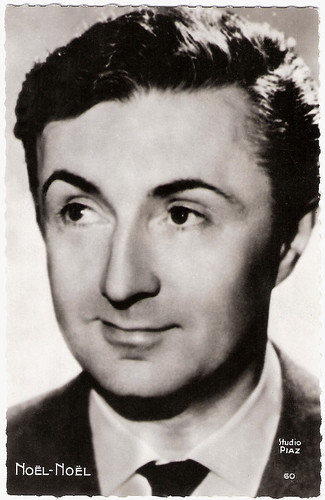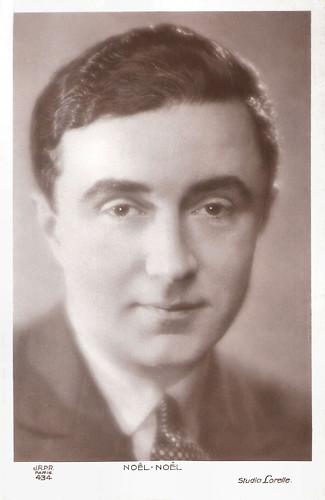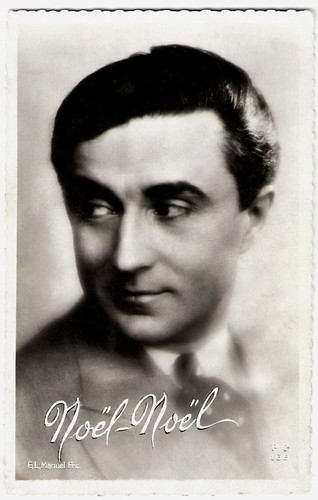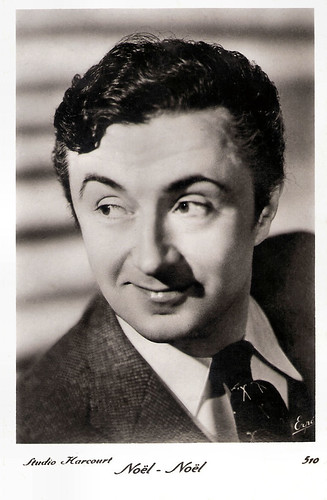
French postcard by Editions P.I., Paris, no. 60. Photo: Studio Piaz.
A blundering, chronically confused soldier
Noël-Noël was born Lucien Édouard Noël in Paris in 1897. He was the son of Charles Celestin Noël, a wine merchant (then employed at the Bank of France), and Marie Eugenie Mathieu. He studied at the Lycee Turgot and learned to play piano. From 1914 to 1917, he was a trainee at the Bank of France, before he left for military service and was mobilised.
After the war, he became a cartoonist for the magazine Le Canard enchaîné and the leftist newspaper l’Humanité. From 1920 on, he started to perform as a singer. He made his stage debut at the music hall Noctambules, accompanying himself at the piano. He was a skilful songwriter. He participated in the revues of the Théâtre de Dix-Heures: 'Ah! La bonne heure' (1927) and 'C'est l'heure exquise' (1928). He continued to write and to compose songs, which he recorded for Odéon.
With a lead role in the comedy La Prison en folie / Prison Madness (Henry Wulschleger, 1930), he began an acting career in film. He appeared in such films as the drama Mistigri (Harry Lachman, 1931) opposite Madeleine Renaud, the comedy Monsieur Albert / Mister Albert (Karl Anton, 1932) with Betty Stockfeld, L'Innocent / Bouquets from Nicholas (Maurice Cammage, 1937), which he also co-wrote, and Sur le Plancher des vaches / On Solid Ground (Pierre-Jean Ducis, 1940) for which he solely wrote the scenario.
Noël-Noël became a star, and he acted more rarely on stage. From October 1938 to the war, he hosted a show on Radio City with Saint-Granier. During the occupation of France, he continued to perform on stage. In 1943, he was banned by the Nazis after singing 'Vaches de boches'.
In 1926, during his years in the music halls and cabarets, he had created the comic character Adémaï, a blundering, chronically confused soldier. Adémaï became the cunning victim of countless misadventures in a series of (short) films written by singer and writer Paul Coline: Adémaï et la Nation armée / Adémaï and the armed nation (Jean de Marguenat, 1932), Adémaï Joseph à l'O.N.M. / Ademai Joseph at the Weather Tower (Jean de Marguenat, 1933), Adémaï aviateur /Skylark (Jean Tarride, 1934) with Fernandel, Adémaï au Moyen Âge / Adémaï in the Middle Ages (Jean de Marguenat, 1935) opposite Michel Simon, and Adémaï bandit d'honneur / Everything 'Appens to Me (Gilles Gragnier, 1943) with Georges Grey. In the last part of the series, Adémaï au poteau-frontière / Adémaï at the Post-border (Paul Coline, 1949), the character is played by Paul Coline himself.

French postcard by J.R.P.R., Paris, no. 434. Photo: Studio Lorelle.

French postcard by Editions P.C., Paris, no. 168. Photo: G.L. Manuel Frères.
Mr. Orchid
In 1945, the year following the Liberation of France, Noël-Noël played the role of Matt Clement in La Cage aux rossignols / A Cage of Nightingales (Jean Dréville, 1945), for which he also participated in the script. Attracting an audience of over five million, it was the most popular French film to be seen in France in 1945. It was nominated for the Academy Award for Best Story and later inspired the successful comedy-drama Les Choristes / The Chorus (Christophe Barratier, 2004). James Travers at French Films: “La Cage aux Rossignols is an engaging film that still has an impact. It effectively makes the point that children thrive better in an environment of mutual respect, where they are encouraged to develop their individual talents, rather than one in which they are brutalised and subjected to inflexible rules administered by unthinking automata with fascistic tendencies.”
Noël-Noël’s greatest role is probably the lead in the drama Le Père tranquille / Mr. Orchid (René Clément, 1946). He played an average, apparently selfish man, mainly concerned with orchids, who is the leader of a network of the French Resistance. Hal Erickson at AllMovie: “Droll French comedian Noel-Noel essays the title role in Le Pere Tranquille (The Quiet Daddy). Contrary to expectations, the star isn't a secret father, but in fact the unknown head of a WW2 resistance movement. By playing the fool whenever the Nazis are around and about, Noel-Noel is able to conceal his double life and successfully carry out his various sabotage missions. This deft combination of comedy and melodrama builds to a particularly suspenseful climax.”
This film, which was entered in the competition of the Cannes Film Festival, allowed Noël-Noël to abandon comic roles for a while, but soon he returned with Les Casse-pieds / The Spice of Life (Jean Dréville, 1948). In 1950, he directed the musical La Vie chantée / Life in a Song, in which he performs many of his hits.
Among his popular successes is also the film À Pied, à cheval et en voiture / On Foot, Horse and on Wheels (Maurice Delbez, 1957) with Denise Grey, which was followed by À Pied, à cheval et en spoutnik / Hold Tight for the Satellite (Jean Dréville, 1958), for which Noël-Noël also worked on the scenario. He played in Messieurs les ronds-de-cuir / The Bureaucrats (Henri Diamant-Berger, 1959) and in the entertaining comedy Les Vieux de la vieille / The Old Guard (Gilles Grangier, 1960) with Jean Gabin and Pierre Fresnay as a trio of irritable, temperamental, grouchy men.
From then on, he gradually abandoned the screen. With Jean Dréville, he created the Science-Fiction TV Mini-Series Le Voyageur des siècles (1971), about a journey back in time. Then, Noël-Noël retired and lived in Nice in the South of France. There he died in 1989. He was 92. He was married twice. In 1920, he married his first wife, Bertha Marie Genevieve Cornet. In 1930, he married Isabelle Jeanne Rosa Julie Lavallée.

French postcard by Erpé, no. 510. Photo: Studio Harcourt.

French postcard by S.E.R.P., Paris, no. 83. Photo: Studio Harcourt.
Sources: James Travers (French Films), Hal Erickson (AllMovie - Page now defunct), Gary Brumburgh (IMDb), Wikipedia (French and English), and IMDb.
This page was last updated on 27 December 2025.
No comments:
Post a Comment